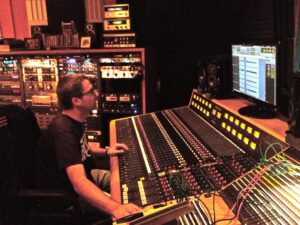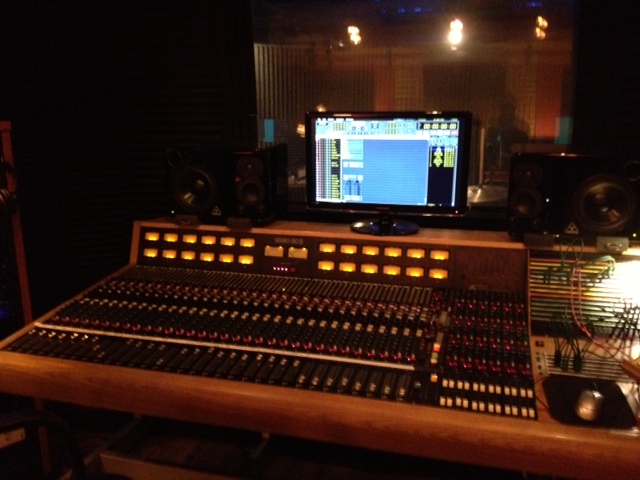Uncategorized
Oxford Recording Studios, Part One: The Need for Tweed

Tweed Recording Owner Andrew Ratcliffe mixes horn tracks for a new album by Oxford artist Adrian Dickey.
Andrew Ratcliffe’s vintage soul goes into every track at Tweed Recording
By Tad Wilkes, Nightlife & Lifestyles Editor
Editor’s Note: In coming weeks, HottyToddy.com will continue to profile recording studios in and near Oxford.
Artists and bands from other parts of the country who discover Tweed Recording are often very moved, upon arrival, says Owner Andrew Ratcliffe. Something about unloading their gear in the Mississippi countryside, out on the way to Coontown Landing outside Oxford, gives musicians an instant feeling of connection to the soil of the state that gave birth to rock ‘n’ roll. And the list of artists who’ve cut records there continues to grow.
But there’s more to Tweed Recording than warm, fuzzy feelings of terroir. To be sure, what makes the place special is Ratcliffe’s ear and touch, which he puts to use with a combination of modern technology and classic, vintage equipment.
Fappy Days
In the mid-to-late 1990s, Ratcliffe and Andrew Dunnaway and Matt Gillentine—members of local rock trio Fappy Tweed—moved into a house in the College Hill Heights subdivision outside town and transformed most of the house into a recording studio they dubbed Tweed Recording. Later, the friends would go in different directions, but Ratcliffe and wife Holli (owner of Holli’s Sweet Tooth in Oxford) moved into a house farther out College Hill Road and built a freestanding studio behind it. In the years since Ratcliffe first began recording in his original studio, his knowledge and skills have progressed “light years,” he says.
“I listen back to some of that stuff,” says Ratcliffe. “I listened to a record that I did on my own [at the old studio] that’s just a monstrosity—not very good compared to what I’m doing now.”

Tweed Recording has its own collection of vintage instruments for artists to use in recording sessions.
His arc of improvement owes to good old-fashioned dedication, “probably more so doing the wrong thing rather than doing the right thing first, and listening back to it,” he says, and it’s all a part of pursuing a certain realm of sound. “I tend to have an ear that’s from being brought up on listening to vinyl. My pop gave me his collection of records of Motown, Stax, and jazz stuff that he listened to. [I’ve tried] to emulate that—recording in a digital world, of course.”
The original Tweed studio used ADAT machines, “which is analog, with a digital format,” Ratcliffe explains. “For the first four or five years of my studio life, I was recording on ADAT, so I became accustomed to honing in on the sound I was going for with the tools that I had. I didn’t have Pro Tools, which was really expensive back then in the first editions of it. When [Pro Tools] did hit, and you could buy it on a laptop or a Mac tower, we bought it for the studio, and I took some classes on it and started hanging out with some people who had it in Nashville, New York, and L. A. I went through two sets of towers we tried to implement in the studio, and for some reason, neither would work. I took that as a sign that maybe the Lord’s not wanting me to run Pro Tools. So, I hung out with a guy I mentored under in Nashville, named Freddie Wall, who was Robert Palmer’s guitar player. He was running Mackie’s version of Pro Tools, which is what you see in front of you now [at Tweed]. It’s a lot more user-friendly. It’s set up like a tape machine, but in a digital format, where you’re recording WAV files.”
Vintage Vibes
Mixing and constructing the arrangements digitally is a modern convenience, but the equipment Ratcliffe uses to actually capture the sounds, before tinkering with them on the computer, brings the right balance of antique warmth and humanity. Invoking the magical feel that’s imbedded in Ratcliffe’s ear from all that old vinyl involves drawing from a collection of microphones “born” in the ‘30s, ‘40s, and ‘50s.
Watch Ratcliffe talk about some of his historic microphones:
“The microphones I’m working with are more ribbon or tube-oriented vintage,” he says. “It’s the same with outboard gear, trying to fashion as much as you can from the analog world in a digital format, where it’s best suited for a band that comes in. If you have someone for two weeks, or a week, or even just a weekend, you want the fastest medium possible, which is digital, but not sacrificing that sound.”
It’s not just the mics but the compressors, limiters, and other vintage equipment used to process the sounds—including some EQs Capitol Records in New York. “They’ve got a good, old, underwater EQ sound, so to speak; it’s the best way to describe that sound of older analog with everybody in a room together,” Ratcliffe says.
His determination to stay the course with his approach is the key to his studio’s success in the long run, even if some short-term clients are turned off.
“I’ll lose some business, because I’ll tell them I’m not in the Pro Tools realm,” Ratcliffe notes. “I don’t own Auto-Tune. I don’t believe in it. You’ve got two schools. One is Pink Floyd, which is this completely beautiful, polished thing. And then you’ve got Led Zeppelin, and you listen to it and think, ‘Man, that guitar is not in tune,’ and [Led Zep singer Robert] Plant refused to do vocal takes more than one time, so he could be in the moment. They’re both great schools. I tend to lean more toward the human being element—let’s not record to a click track; let’s get everybody in the room and play live. That’s fun, and that’s the way it should be done.”
Ratcliffe says most of his clients come to him due to word-of-mouth as his sound spreads. It doesn’t hurt that his studio and talents are showcased on recordings and episodes of Oxford Sounds, a look inside Oxford recording studios such as Tweed Recording, Sweet Tea, Fat Possum, and Black Wings.
“I’m getting emails and phone calls from people who’ve heard [an album recorded at Tweed] and said, ‘Hey man, I really dig the way that sounds.’ A lot of times bands come through town who are friends of a friend and need a place to crash, and if I don’t have anyone in the studio, I’ll say, ‘You’re more than welcome to crash in the studio.’ Nine times out of 10, people walk in the door and say, ‘You’ve got a real studio. It’s not somebody with a Pro Tools rig in their bedroom. I’ve been blessed to accumulate what I have in the 15 years of being here.”
Oxford native Tad Wilkes attended Millsaps College and graduated from Ole Miss with a BA in journalism in 1994 and a JD in 2000. He is a lawyer, magazine editor, writer, and songwriter in Oxford.









































